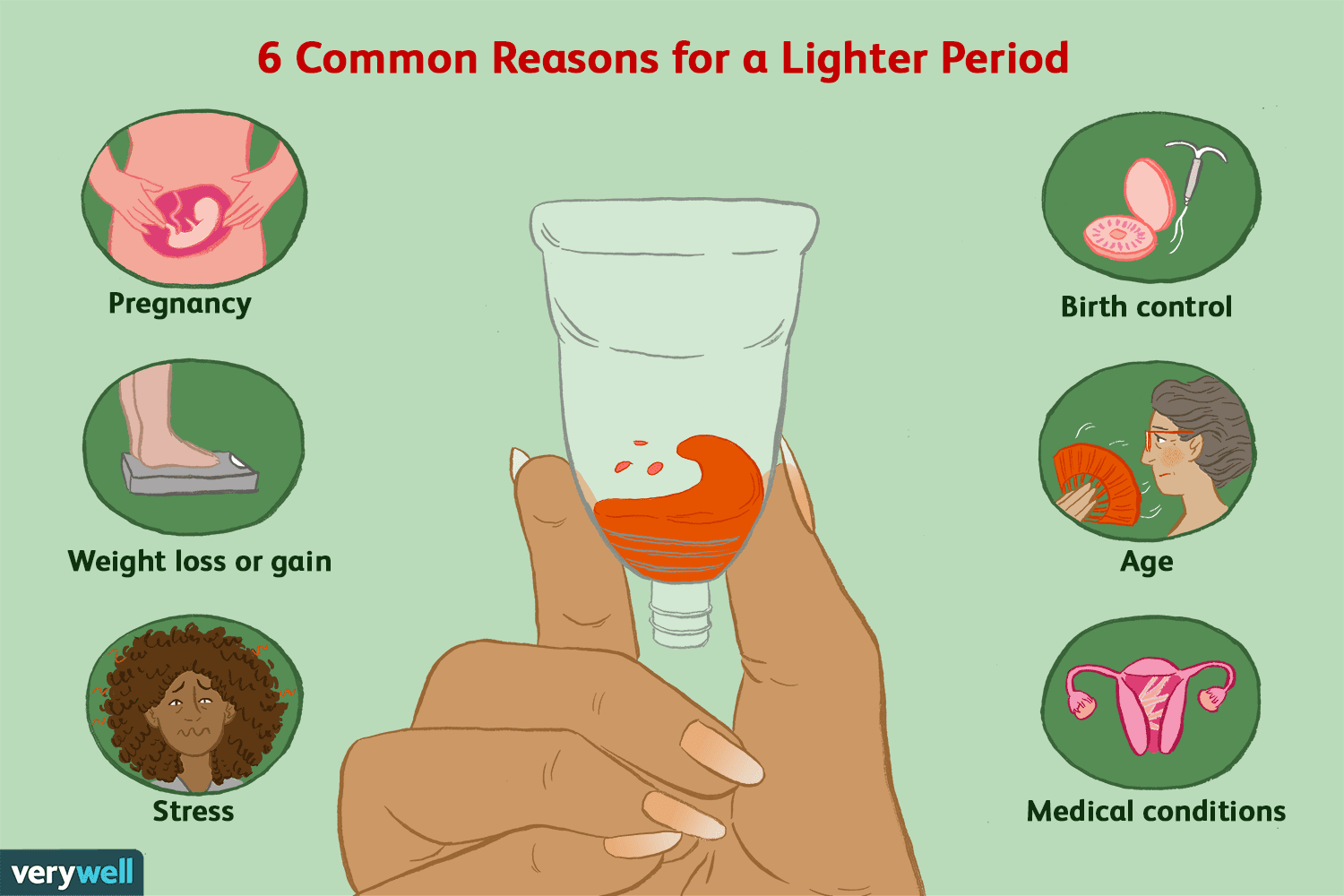6 Common Reasons for Lighter Periods
A lighter period than normal can be caused by many things, including pregnancy, stress, and illness. Sometimes a woman will have spotting and think her period is about to start and not see any more bleeding. This can be implantation bleeding, which is the earliest sign of pregnancy, but it can also be that your period is lighter that month.
There are numerous reasons why your period is lighter than usual. This article covers a few of the common ones.

Pregnancy
If your period seems unusual in any way, take a pregnancy test. Pregnancy is the most likely cause of something being different in your cycle, particularly if you have not been using birth control.
To get the best results, it might be best to wait until you miss your next period. You can take a home pregnancy test or see your healthcare provider to get tested. In most cases, you do not have to tell anyone about the test or the results until you are ready.
If you had a lighter-than-normal period, you should tell your doctor or midwife, even if you know you are pregnant. This can alter your expected due date, making you further along or less further along than you thought. Having the wrong date can shift some tests and other parts of your prenatal care.
Weight Loss or Gain
If you have suddenly gained or lost a lot of weight, you may see a change in your menstrual cycle. Exercising too much can also affect your periods because it puts a lot of physical stress on your body.
Can Weight Gain or Loss Change Your Period?Stress
Emotional stress, such as the loss of a loved one, or major life stressors in work or your home life can take a toll on your body and affect your menstrual cycle.
Birth Control
Going on hormonal birth control can also cause a change in your period. It is not uncommon for women to experience lighter-than-usual periods and shorter periods while on a birth control pill or after getting a hormonal IUD, such as Mirena.
If a change in your period bothers you, you can stop using hormone-based contraceptives. There are hormone-free options for birth control including male and female condoms, a non-hormonal IUD device, and spermicidal foams.
Be sure to ask your midwife or doctor for advice on the method that is best for you.
Compare Birth Control ChoicesAge
If you are getting older, your periods may shift. You may be pre-menopausal. This does not mean you are no longer fertile, just that you are less likely to get pregnant. If you do not want to get pregnant, you should still use birth control until menopause.
What to Expect As Menopause ApproachesMedical Conditions
There are medical conditions, such as cervical stenosis or Asherman's syndrome, that may cause a lighter flow than expected, though cramping may still occur. For example, cervical stenosis is uncommon, but it can cause menstrual blood to get trapped in the uterus.
Asherman's syndrome is caused by uterine scarring following a dilation and curettage procedure (D&C), in which tissues from the uterus are removed.
Consult with your doctor if you have a lighter period than normal but are still having intense cramps.
Summary
Your period can be lighter than normal due to natural reasons, such as pregnancy or increasing age. It can also be lighter because of the birth control you are using, particularly if you are taking hormonal birth control pills or using a hormonal IUD. If your period seems off and you're not sure why, let your doctor know.
A Word From Verywell
Even if your periods seem consistent, it's a good idea to take note of your period each month—how heavy it is, what period symptoms you are having, and how many days your period lasts. Consider downloading a period tracker app on your smartphone, or simply taking notes about your period in your calendar. This way, if something is unusual about your period one month, you'll be more likely to notice.
-
Ashermans syndrome, characterized by scarring in the uterus, is a condition most often associated with a common surgical procedure called dilation and curettage (D&C). The D&C may be used to remove excess tissue for any number of reasons
-
When it comes to the first few weeks of breastfeeding, everyone is a beginner that first time around! Many women will have set a breastfeeding goal: three months, six months, one year – whatever feels right.During the first several weeks
-
You could bounce a quarter off my boobs right now. Actually, if you did that, I might judo-chop you as I begin to cry and clutch my jugs like they’re going to burst.I am in the process of letting my milk dry up. This is a personal choice


